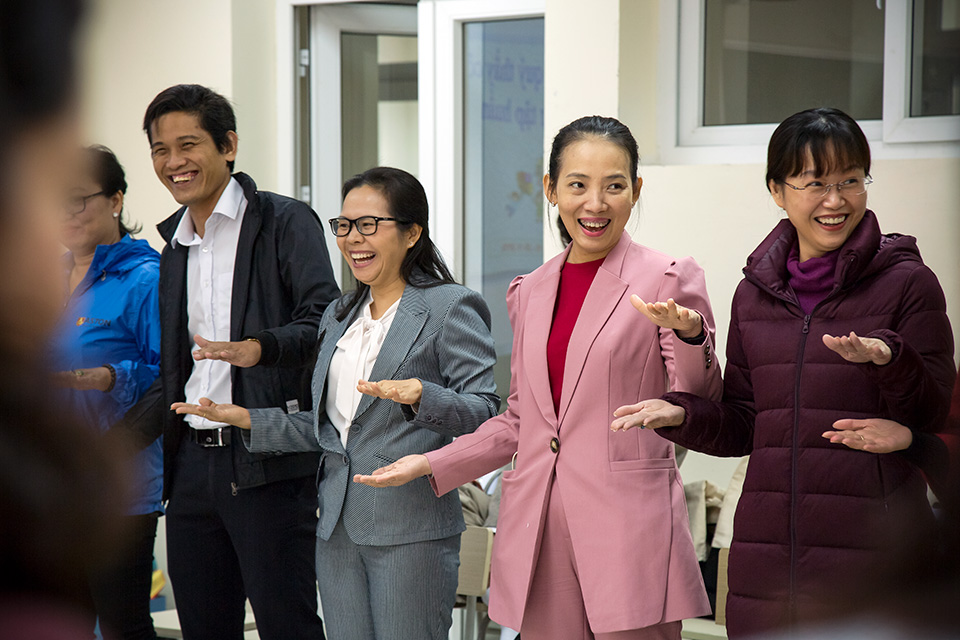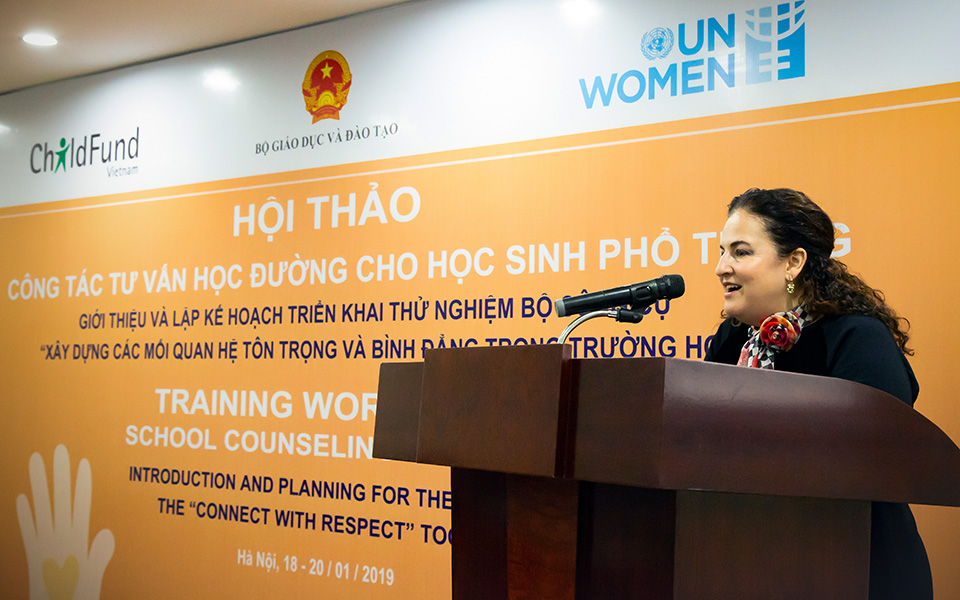For a violence-free education environment
Date:

[Press Release]
Ha Noi, Viet Nam — The Ministry of Education and Training, ChildFund Vietnam and the United Nations Entity for Gender Equality and the Empowerment of Women (UN Women) have introduced the "Connect with Respect” toolkit. The toolkit was adjusted to the context of Viet Nam and will be piloted in secondary schools in provinces including Bac Kan, Cao Bang, Ha Giang, Hoa Binh, Ha Noi, Da Nang and Ho Chi Minh city.

The "Connect with Respect: Preventing gender-based violence in schools" toolkit has been compiled based on scientific research and experience from many programs across various countries in the Asia-Pacific region, with the objective of supporting secondary school teachers to prevent gender-based violence in schools, through interactive activities and lessons. The designed activities will encourage constructive relationships, gender equality and solidarity among students aged 11 to 14. This material can be used in schools and other informal education environments, such as community learning or literacy programmes, and can also be adapted for older or younger students.
The toolkit was developed by the University of Melbourne with the support of the School-Related Gender-Based Violence working group, under the East Asia and Pacific United Nations Girls Education Initiative (UNGEI) and UNiTE to end violence against women project (with the participation of Plan International, UN Women, UNESCO and UNICEF).
It is estimated that 246 million girls and boys experience violence in schools each year around the world. In Viet Nam, there have been some gender-based violence cases in schools recently. According to a study conducted by UNESCO on gender-based violence in schools in six provinces in the North, Central and South of Viet Nam in 2015, more than half of the students participating in the study said they had been victims of at least one violent act within the previous 6 months. Students in the first grades of secondary school were the most affected. Gender-based violence in schools not only affects academic performance but also negatively affects mental health, causing students to become self-deprecating and depressed. In some cases, it led to unwanted pregnancy and sexual transmitted diseases such as HIV. This has increased the risk of children dropping out of school.
In addition, recent studies show that gender-based violence in schools can be associated with the loss of one primary grade of schooling - about 17 billion USD a year to low and middle income countries. This figure is higher than the total amount of international funding for education interventions every year.
Commenting on the documentation, Mr Bui Van Linh, Deputy Head of Politics Training for Students Department, Ministry of Education and Training stated that: “The documentation and the workshops to introduce and plan the implementation of this toolkit is one of the important steps of the Ministry of Education and Training and its partners (UN Women, ChildFund and Plan International) in implementing the Decree on building a Safe, Friendly and Non-Violent Schools and Circular 31 on Psychological Counseling for students. After two years of observation and conducting adaptative research, the Toolkit is ready for testing in Viet Nam. We believe that the pilot of this toolkit in selected provinces will provide specific evidence on the effectiveness of application of the toolkit in building respectful and equal relationships in schools, serving as the basis for national replication in the future.”

Head of office of UN Women in Viet Nam, Ms. Elisa Fernandez Saenz said: “We appreciate the efforts of the Ministry of Education and Training in the decision of testing the toolkit to provide quality, comprehensive and equal education for all children. Children need to learn about how to build and maintain the relationships in school based on respect and equality, from which they will apply these principles in their lives.”
ChildFund Vietnam’s Country Director, Ms. Nguyen Thi Bich Lien shared, “In such a turbulent world, children and adolescents today are facing many new challenges. They not only need to make great efforts in their studies but also need to be supported to enhance their knowledge and appropriate behavioral understanding to be global citizens so that when they grow up they can affirm with confidence "I am educated, I have a future". I believe this collaboration among the Ministry of Education and Training, ChildFund and UN Women will continue to pave the way to positive changes that contribute to the sustainable development goals that we are all aiming for.”
For teachers, who work as counselors to prevent gender-based violence in school, the “Connect with Respect” toolkit will be discussed and planned at the workshop. The workshop is organised by the Ministry of Education and Training with the support of UN Women and ChildFund Vietnam.
For further information, please contact:
Nguyen Thi Kieu Trang
Communications ManagerChildFund Vietnam
Mobile phone: 0904879991| Email: trangnk@childfund.org.vn
Doan Thanh Ha
Communications SpecialistUN Women Viet Nam
Mobile phone: 0985080631| Email: doan.ha@unwomen.org
About ChildFund Vietnam
ChildFund Vietnam is the representative office of ChildFund Australia – an independent international development organisation that works to reduce poverty for children in developing communities.
ChildFund Australia is a member of the ChildFund Alliance – a global network of 11 organisations which assists more than 14 million children and their families in over 60 countries. ChildFund Australia is a registered charity, a member of the Australian Council for International Development, and fully accredited by the Department of Foreign Affairs and Trade which manages the Australian Government’s overseas aid program.
ChildFund began working in Viet Nam in 1995 and works in partnership with children, their communities and local institutions to create lasting change, respond to humanitarian emergencies and promote children’s rights. Projects are implemented across the northern provinces of BacKan, Cao Bang and Hoa Binh, where the majority of people are from ethnic minority groups, often the most vulnerable or marginalised sections of the population.
With a focus on education, water and sanitation, sustainable livelihoods, child rights and child protection, food security, and maternal and child health, including HIV prevention, ChildFund Vietnam also prioritises building the resilience of young people, by giving children and youth the opportunity to take part in sports, vocational education and life skills training, and supporting their participation in local decision‐making processes.
About UN Women Viet Nam
UN Women is the UN agency promoting the empowerment of women. It helps set global standards for achieving gender equality and works with governments and civil society groups to design laws, policies, programmes and services to implement these standards.
Over the past 30 years, Viet Nam has transformed from one of the poorest to one of the most dynamic emerging countries in the world. While the majority of Vietnamese citizens have benefited from rapid growth, gender norms and stereotypes have prevented many women from reaching their full potential. UN Women in Viet Nam works to promote gender equality across all spheres of society by enhancing women’s economic empowerment, increasing women’s resilience and adaption to climate change, ending violence against women and girls as well as advocating for gender equality to become a key part of national development planning and budget allocation.